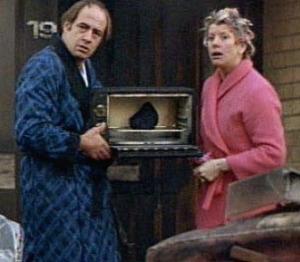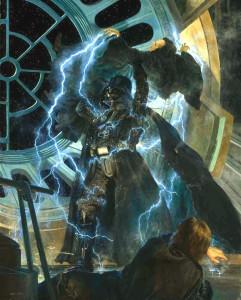 “Evil” is not a noun; it is an adjective. It’s certainly true that many people pretend that “evil” can be a substance, like an energy field or a poison; we speak of “the essence of evil” or say that people are “full of evil” and the like. But that’s a relic of our language going back to a more primitive time when we really did believe that things like “sin” and “evil” could be actual pollutants, like particles that could radiate from or rub off on objects or people and contaminate them. We also still say that “the sun rose”, even though everyone knows it’s the Earth that moves rather than the sun. Of course, most people still act as though the sun is moving relative to the Earth rather than vice-versa, and even more act as though “evil” were a kind of radiation and moral “purity” a measurable quality like the purity of water. But while the former is harmless to anyone who isn’t plotting the course of a spacecraft, the latter is one of the most harmful atavisms in human behavior; it is used to justify innumerable laws revolving around exorcising, isolating and/or “correcting” those who are “impure” (consider for a moment why words like “dirty” are used to describe sex and “clean” to describe celibacy or sobriety).
“Evil” is not a noun; it is an adjective. It’s certainly true that many people pretend that “evil” can be a substance, like an energy field or a poison; we speak of “the essence of evil” or say that people are “full of evil” and the like. But that’s a relic of our language going back to a more primitive time when we really did believe that things like “sin” and “evil” could be actual pollutants, like particles that could radiate from or rub off on objects or people and contaminate them. We also still say that “the sun rose”, even though everyone knows it’s the Earth that moves rather than the sun. Of course, most people still act as though the sun is moving relative to the Earth rather than vice-versa, and even more act as though “evil” were a kind of radiation and moral “purity” a measurable quality like the purity of water. But while the former is harmless to anyone who isn’t plotting the course of a spacecraft, the latter is one of the most harmful atavisms in human behavior; it is used to justify innumerable laws revolving around exorcising, isolating and/or “correcting” those who are “impure” (consider for a moment why words like “dirty” are used to describe sex and “clean” to describe celibacy or sobriety).
The truth is, “evil” is not something a person is; it’s something a person does. An evil person is not one who is suffused with some malefic and primordial spiritual force; it’s one who performs evil acts. It’s not possible to be evil without doing evil, and it’s equally impossible to knowingly, willingly and consistently do evil and yet be considered good. The problem is our insistence that the universe adhere to a Manichean duality which does not reflect reality in any measurable way; we speak of “good people” and “evil people” as though they were as different as chalk and cheese, when in fact all people are capable of both. And the only meaningful way in which any person can be described as “good” or “evil” is by the preponderance of their actions. Most people describe me as a good person: I fight for what I believe is right; I try to refrain from causing harm; I help others whenever possible; I strive to be honest and noble and fair in all of my dealings with others; I suffer when I believe that I’ve inadvertently caused harm; and I’m almost unfailingly loyal and trustworthy to everyone I love. Of course, I’ve done evil things, just as everyone has; at the very least, I maintain my continued existence by killing other life-forms every single day (and don’t get too smug, vegans; you kill to survive as well, though you pretend that you’re morally superior because the creatures you eat can’t move. Tell that to barnacles and Venus’s flytraps). Saying I’m a “good person” doesn’t mean I’m an angelic being incapable of wrongdoing; it means that the balance of my actions, taken in aggregate, bring more weal than woe to other humans. The same is true of evil people; an evil person isn’t a demonic entity incapable of doing good, but rather a human whose actions, taken in aggregate, bring more suffering into the world than joy.
 And yet, the primitive and childish insistence on moral purity continues. We’re told that a politician was responsible for a law that helped hundreds of needy people, as though that wipes away the fact that he gave orders to murder thousands in cold blood. We’re told that a young man had been accused in the past of shoplifting and fighting, as though that justified his being gunned down in the street like a mad dog. And we’re told that the majority of cops are “good” because they’re not known to have ever murdered or raped anyone, despite the fact that they’ve tacitly and knowingly agreed to uphold all the laws, even the ones which are clearly and obviously evil, through the use of violence. A system which robs the innocent, grinds down the poor, cages people who have done no wrong to others, protects rapists and murderers in the ruling class from the consequences of their actions, terrorizes the populace via threats and propaganda, destroys the lives of individuals and the fabric of entire communities because some of them violated petty and arbitrary rules, and commits other atrocities too numerous to list in this short essay, is an evil system. Those who defend that system, those who obstruct meaningful reform of that system, those who increase the size and power of that system, and those who agree to ignore their own moral judgment in order to unthinkingly implement the wrongs of that system with their own hands and brains and weapons, are all evil. This doesn’t mean they’re monsters or devils; they’re human beings like any other. But they are humans whose actions against their fellows, when taken as a whole, have done far more harm than good. They are evil people, and those who defend their actions – even out of ignorance or moral retardation – are themselves accessories to those evil acts.
And yet, the primitive and childish insistence on moral purity continues. We’re told that a politician was responsible for a law that helped hundreds of needy people, as though that wipes away the fact that he gave orders to murder thousands in cold blood. We’re told that a young man had been accused in the past of shoplifting and fighting, as though that justified his being gunned down in the street like a mad dog. And we’re told that the majority of cops are “good” because they’re not known to have ever murdered or raped anyone, despite the fact that they’ve tacitly and knowingly agreed to uphold all the laws, even the ones which are clearly and obviously evil, through the use of violence. A system which robs the innocent, grinds down the poor, cages people who have done no wrong to others, protects rapists and murderers in the ruling class from the consequences of their actions, terrorizes the populace via threats and propaganda, destroys the lives of individuals and the fabric of entire communities because some of them violated petty and arbitrary rules, and commits other atrocities too numerous to list in this short essay, is an evil system. Those who defend that system, those who obstruct meaningful reform of that system, those who increase the size and power of that system, and those who agree to ignore their own moral judgment in order to unthinkingly implement the wrongs of that system with their own hands and brains and weapons, are all evil. This doesn’t mean they’re monsters or devils; they’re human beings like any other. But they are humans whose actions against their fellows, when taken as a whole, have done far more harm than good. They are evil people, and those who defend their actions – even out of ignorance or moral retardation – are themselves accessories to those evil acts.
